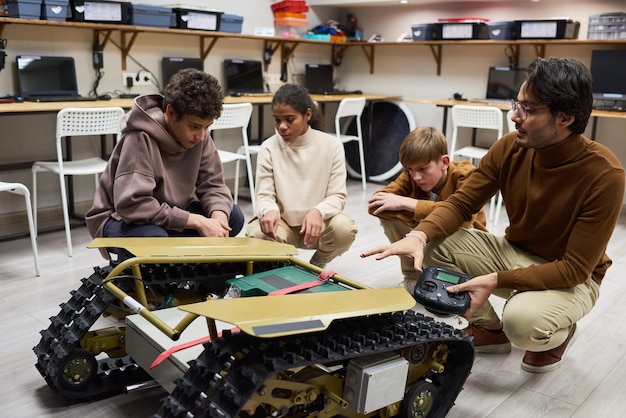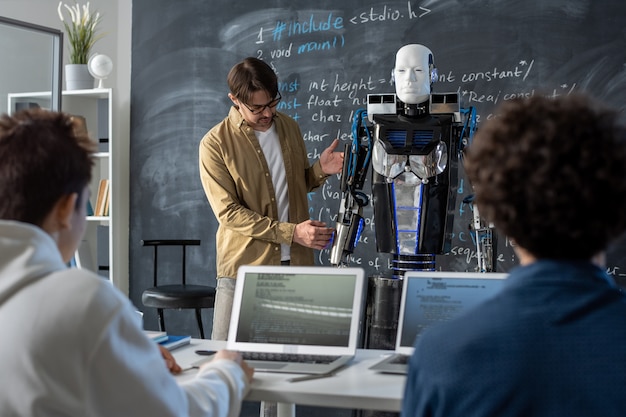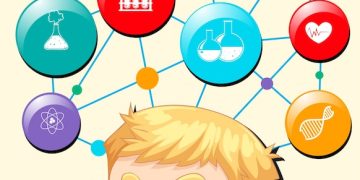The Impact of AI on College Curriculum: Preparing for the Future

The Impact of Artificial Intelligence on College Curriculum: Preparing Students for the Future of Work is reshaping higher education, influencing curriculum design, teaching methodologies, and skill development to align with the demands of an evolving job market.
The integration of artificial intelligence is no longer a futuristic concept; it’s a present-day reality rapidly transforming various sectors, including education. Understanding the impact of artificial intelligence on college curriculum: preparing students for the future of work is crucial for institutions aiming to equip their students with the skills needed to thrive in a rapidly evolving job market.
Understanding the Role of AI in Modern Education
Artificial intelligence is increasingly becoming a fundamental tool in modern education. Its applications span from personalized learning experiences to automating administrative tasks, allowing educators to focus more on student engagement and development.
AI-Driven Personalized Learning
One of the most significant impacts of AI is its ability to personalize learning. By analyzing student data, AI algorithms can identify individual learning gaps and tailor educational content to meet specific needs.
Automating Administrative Tasks
AI is also streamlining administrative processes in colleges and universities. Tasks like admissions processing, grading, and scheduling can be automated, freeing up time for faculty and staff to focus on more critical activities.
- Personalized Feedback: AI systems can provide instant feedback on assignments, helping students to identify areas for improvement.
- Adaptive Testing: AI can adjust the difficulty of tests based on a student’s performance, providing a more accurate assessment of their knowledge.
- Predictive Analytics: AI can predict student performance and identify students who may need additional support.
In conclusion, AI’s role in modern education is multifaceted, enhancing both the learning experience and the efficiency of educational institutions by tailoring content and simplifying operations.

Curriculum Changes Driven by Artificial Intelligence
The integration of AI necessitates significant curriculum changes to ensure that students are well-prepared for the future workforce. This involves introducing new courses, updating existing ones, and emphasizing skills that complement AI capabilities.
Introducing New AI-Related Courses
Many colleges are now offering specialized courses in AI, machine learning, and data science. These courses provide students with the technical skills needed to develop and implement AI solutions.
Updating Existing Course Content
Beyond introducing new courses, it’s essential to update existing curricula to incorporate AI concepts and applications. This includes integrating AI into fields like business, healthcare, and engineering.
Curriculum changes driven by artificial intelligence are pivotal in equipping students with the knowledge and skills required to navigate the future job market successfully.
Preparing Students for AI-Driven Industries
The integration of AI across industries is rapidly changing the skills that employers seek in their workforce. College curricula must adapt to prepare students for these evolving demands.
Focus on Critical Thinking and Problem-Solving
As AI takes over routine tasks, the importance of critical thinking and problem-solving skills is increasing. Curricula should emphasize these skills through case studies, simulations, and real-world projects.
Enhancing Creativity and Innovation
AI can assist with many creative tasks, but it cannot replace human creativity and innovation. Colleges should foster these skills through design thinking, arts programs, and interdisciplinary collaborations.
- Data Analysis: Understanding how to interpret and analyze data is crucial in an AI-driven world.
- AI Ethics: Students should be educated about the ethical implications of AI and how to develop responsible AI solutions.
- Human-Computer Interaction: Designing user-friendly interfaces and understanding how humans interact with AI systems is essential.
In summary, preparing students for AI-driven industries necessitates a focus on critical thinking, creativity, and specialized skills that complement AI’s capabilities.
The Importance of Ethical Considerations in AI Education
As AI becomes more prevalent, it’s crucial to address the ethical implications of its use. Colleges have a responsibility to educate students about AI ethics and promote the development of responsible AI solutions.
Developing Ethical Frameworks for AI
Colleges should integrate ethical frameworks into AI courses, teaching students how to identify and address potential biases, privacy concerns, and societal impacts of AI.
Promoting Responsible AI Development
Students should be encouraged to develop AI solutions that are transparent, accountable, and fair. This includes considering the potential consequences of AI on marginalized groups and promoting inclusivity in AI development.
- Bias Detection and Mitigation: Learning how to identify and mitigate biases in AI algorithms is crucial for ensuring fairness.
- Data Privacy: Understanding data privacy regulations and how to protect sensitive information is essential.
- Transparency and Explainability: Emphasizing the importance of transparency in AI systems and making them explainable to users.
In conclusion, integrating ethical considerations into AI education is essential for fostering responsible AI development and ensuring that AI is used for the benefit of society.

The Role of Faculty in AI Integration
Faculty members play a crucial role in the successful integration of AI into college curricula. They need to be trained in AI concepts and equipped with the tools and resources to effectively teach AI-related content.
Training Faculty in AI Concepts
Colleges should invest in training programs that provide faculty with a foundational understanding of AI, machine learning, and data science. These programs can help faculty integrate AI concepts into their existing courses.
Providing Resources and Support
Faculty need access to the latest AI tools, software, and datasets to effectively teach AI-related content. Colleges should provide these resources and offer ongoing support to faculty as they incorporate AI into their teaching.
The role of faculty in AI integration is paramount, requiring investment in training and resources to ensure effective teaching and curriculum development.
Challenges and Opportunities in AI Curriculum Development
The integration of AI into college curricula presents both challenges and opportunities. Overcoming these challenges and leveraging the opportunities is essential for preparing students for the future of work.
Addressing the Skills Gap
One of the main challenges is the skills gap between what colleges are teaching and what employers need. Colleges need to work closely with industry partners to identify the skills that are in demand and update their curricula accordingly.
Leveraging AI for Personalized Learning
AI can be used to create personalized learning experiences that cater to individual student needs. Colleges should leverage AI to provide customized feedback, adaptive testing, and targeted support.
In summary, curriculum development in AI invites both challenges and opportunities that, when navigated effectively, equip students with the skills needed to thrive in an AI-centric world.
| Key Aspect | Brief Description |
|---|---|
| 🤖 AI Integration | Incorporating AI into existing curricula and creating new AI-focused courses. |
| 🧠 Skill Development | Focusing on critical thinking, problem-solving, and creativity. |
| ⚖️ Ethical AI | Promoting responsible AI development and addressing ethical concerns. |
| 🧑🏫 Faculty Training | Equipping faculty with the necessary AI knowledge and resources. |
Frequently Asked Questions
▼
AI is used in college curricula through personalized learning software, automated grading systems, and AI-focused courses like machine learning and data science. It enhances both teaching and learning processes.
▼
The most important skills include critical thinking, problem-solving, data analysis, AI ethics, and human-computer interaction. These skills complement AI’s capabilities and are highly valued by employers.
▼
Colleges can integrate ethical frameworks into AI courses, promote responsible AI development, and emphasize data privacy and bias detection. This ensures that AI is developed and used ethically.
▼
Faculty need access to AI tools, software, datasets, and training programs. Colleges should also provide ongoing support to help faculty effectively incorporate AI into their teaching methods and curricula.
▼
The main challenges include addressing the skills gap between academia and industry, ensuring ethical AI development, and providing adequate resources and training for faculty. Overcoming these challenges is key.
Conclusion
In conclusion, the integration of AI into college curricula is essential for preparing students for the future workforce. By understanding the role of AI in modern education, addressing ethical considerations, and equipping faculty with the necessary resources, colleges can ensure that students are well-prepared to thrive in an AI-driven world.





